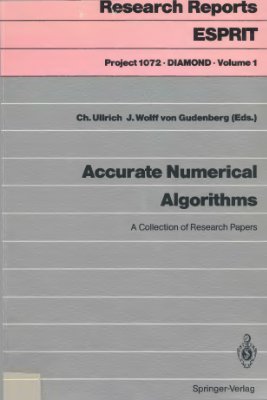Springer, 1989. - 249 pages.
The major goals of the ESPRIT Project 1072, DIAMOND (Development and Integration of Accurate Mathematical Operations in Numerical Data-Processing), were to develop a set of accurate numerical algorithms (work package 3) and to provide tools to support their implementation by means of embedding accurate arithmetic into programming languages (work package 1) and by transformation techniques which either improve the accuracy of expression evaluation or detect and eliminate presumable deficiencies in accuracy in existing programs (work package 2). The present volume mainly summarizes the results of work package
2. It comprises research papers about the development and the implementation of self-validating algorithms which automatically verify the results of a numerical computation. Algorithms for the solution of eigenvalue/eigenvector problems, linear systems for sparse matrices, nonlinear systems and quadrature problems, as well as computation of zeros of a complex polynomial are presented. The algorithms always deliver guaranteed results, i.e. the true result is enclosed into sharp bounds.
The major goals of the ESPRIT Project 1072, DIAMOND (Development and Integration of Accurate Mathematical Operations in Numerical Data-Processing), were to develop a set of accurate numerical algorithms (work package 3) and to provide tools to support their implementation by means of embedding accurate arithmetic into programming languages (work package 1) and by transformation techniques which either improve the accuracy of expression evaluation or detect and eliminate presumable deficiencies in accuracy in existing programs (work package 2). The present volume mainly summarizes the results of work package
2. It comprises research papers about the development and the implementation of self-validating algorithms which automatically verify the results of a numerical computation. Algorithms for the solution of eigenvalue/eigenvector problems, linear systems for sparse matrices, nonlinear systems and quadrature problems, as well as computation of zeros of a complex polynomial are presented. The algorithms always deliver guaranteed results, i.e. the true result is enclosed into sharp bounds.

